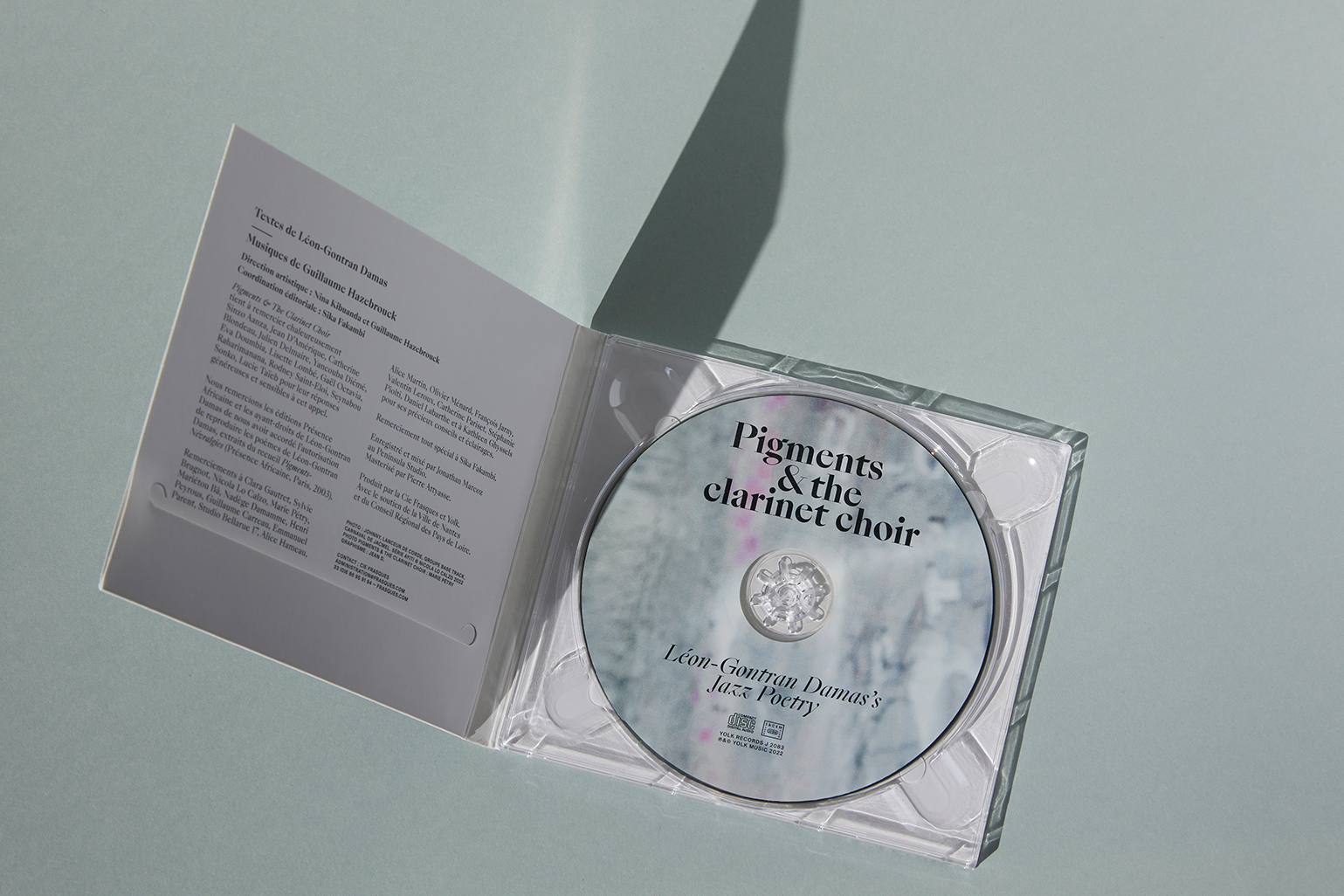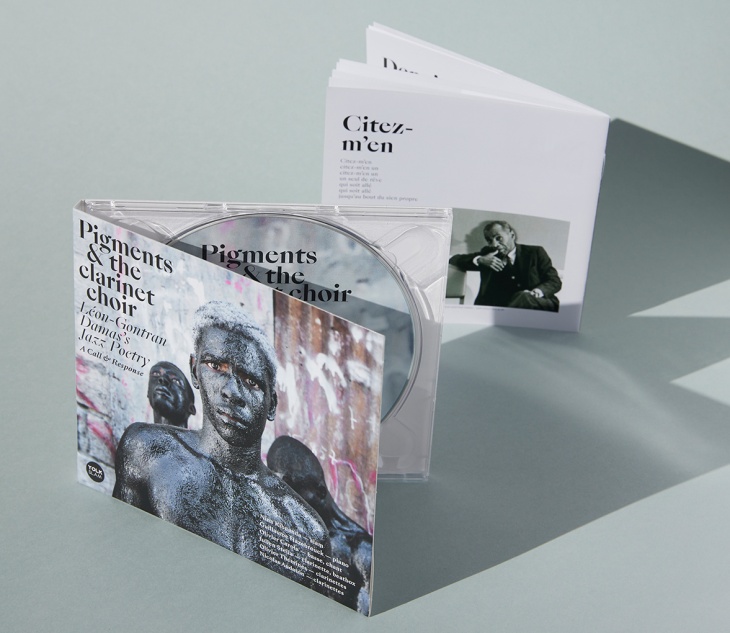



reference number : J2083
release date : 16/06/2022
release date : 16/06/2022
Photos : cover © Nicola Lo Calzo / Pigments © Marie Pétry © Annabelle Tiaffay
Video
about this album
Born from the meeting between the slammer-poet Nina Kibuanda and the musician Guillaume Hazebrouck, the PIGMENTS & The Clarinet Choir project arises from a shock – that of the discovery of the texts of the poet Léon-Gontran Damas.
Damas strikes us today with the intensity, the immediacy, the urge of his words. Its message, born in reaction to colonial oppression but also to assimilation policies, takes on a particular resonance at a time when the importance of recognizing multiple cultural affiliations and identities is more than ever to be affirmed.
It has been said of the writing of Damas that it is a poetry of graffiti as its nervous, concise language is made of ruptures, iterations, shocks and rhythms. A poetic dimension close to orality which also allows friend Léopold Sédar Senghor to compare it to blues and jazz.
The PIGMENTS & THE CLARINET CHOIR project takes hold of this living, vibrant language to restore both its vehemence and infinite tenderness.
With his unique writing and unique instrumentation, Guillaume Hazebrouck clashes with the freedom of jazz, the breath of hip hop, the warmth of Caribbean music (where the clarinet holds a special place).
Carried by the voice and the charismatic presence of Nina Kibuanda, a sound and poetic dramaturgy emerges, all in contrasts, tense between vivacity and languor, vehemence and appeasement, power and softness.
Léon-Gontran Damas's Jazz Poetry / A Call & Response
The libretto incorporates the poetic contributions of Sinzo Aanza, Jean D'Amérique, Catherine Blondeau, Julien Delmaire, Yancouba Diémé, Eva Doumbia, Lisette Lombé, Gaël Octavia, Raharimanana, Rodney Saint-Eloi, Seynabou Sonko, Lucie Taïeb. At the invitation of Sika Fakambi, editorial coordinator of the project, these major authors of contemporary poetry responded to the poems of Damas in a plural, vibrant, strong way. A bundle of poetic and musical dialogues is woven throughout the album.
By Kathleen Gyssels
As many critics have seen, the musicality of the poetry of Léon-Gontran Damas would be the expression of the "negro" rhythm and of those of his generation, he would have been the most jazzy. The poetry of Damas deserves better: just listen to it set to music by Pigments and The Clarinet Choir, to understand how much it transcends black Africa and the Caribbean because through the added value of an instrumental interpretation in addition to a rare poetic recitation, these are the dramas of the individual uprooted and demotivated by the social body and an unfriendly environment. Drama of loneliness and drama of incomprehension, hope for reconciliation and rage against the impasse of the racial question in a supposedly multicultural France take turns. With their caustic project, Pigments and the clarinet choir offer a breathtaking score to the nervous and loving poetry of L.G. Damas.
Kathleen Gyssels, Dalhousie french Studies, Canada, july 2020
Leon-Gontran Damas
Precursor with Césaire and Senghor of the movement of negritude, the Guyanese poet Leon-Gontran Damas created the scandal in 1937 with the publication of his collection Pigments. Considering the issue of discrimination on a planetary scale ("race", religion, language, nationality and sexual preference), he already signs post-negritude as he considers that it is necessary to go beyond dualities (white/black, rich/poor, male/female). According to the writer Daniel Maximin, “he is one of the least known, one of the greatest poets of the Caribbean world. He is the poet of absolute sincerity, of laying bare. The only one who dared to speak of love in the midst of decolonization…”. Only the remarkable interventions of the former Minister of Justice Christiane Taubira, quoting him in full national assembly to castigate civic inequalities during the debate around "marriage for all", contributed to bringing him out of oblivion.
Photo cover by Nicola Lo Calzo (title: Johnny, rope launcher and member of Group Base Track, Carnival in Jacmel. Ayiti)
Nicola Andrea Lo Calzo is a photographer, queer artist and teacher-Phd-researcher born in Turin in 1979. He lives and works in Paris where he teaches on postcolonial perspectives in photography at École nationale supérieure d'arts Paris-Cergy (ENSAPC). Trained as an heritage curator at the Polytechnic University of Turin, he shifted to photography in 2008. His photographic practice and research are attentive to questions surrounding heritage, coloniality and identity. Nicola Lo Calzo’s photographs focus on the ways in which subalterns groups interact with their environment, the ways in which they develop strategies of survival and resistance. Nicola A. Lo Calzo is recipient of the Cnap grant in 2018, nominated for the Prix Elysee in 2019 and nominated for the Prix Niépce in 2020.
Damas strikes us today with the intensity, the immediacy, the urge of his words. Its message, born in reaction to colonial oppression but also to assimilation policies, takes on a particular resonance at a time when the importance of recognizing multiple cultural affiliations and identities is more than ever to be affirmed.
It has been said of the writing of Damas that it is a poetry of graffiti as its nervous, concise language is made of ruptures, iterations, shocks and rhythms. A poetic dimension close to orality which also allows friend Léopold Sédar Senghor to compare it to blues and jazz.
The PIGMENTS & THE CLARINET CHOIR project takes hold of this living, vibrant language to restore both its vehemence and infinite tenderness.
With his unique writing and unique instrumentation, Guillaume Hazebrouck clashes with the freedom of jazz, the breath of hip hop, the warmth of Caribbean music (where the clarinet holds a special place).
Carried by the voice and the charismatic presence of Nina Kibuanda, a sound and poetic dramaturgy emerges, all in contrasts, tense between vivacity and languor, vehemence and appeasement, power and softness.
Léon-Gontran Damas's Jazz Poetry / A Call & Response
The libretto incorporates the poetic contributions of Sinzo Aanza, Jean D'Amérique, Catherine Blondeau, Julien Delmaire, Yancouba Diémé, Eva Doumbia, Lisette Lombé, Gaël Octavia, Raharimanana, Rodney Saint-Eloi, Seynabou Sonko, Lucie Taïeb. At the invitation of Sika Fakambi, editorial coordinator of the project, these major authors of contemporary poetry responded to the poems of Damas in a plural, vibrant, strong way. A bundle of poetic and musical dialogues is woven throughout the album.
By Kathleen Gyssels
As many critics have seen, the musicality of the poetry of Léon-Gontran Damas would be the expression of the "negro" rhythm and of those of his generation, he would have been the most jazzy. The poetry of Damas deserves better: just listen to it set to music by Pigments and The Clarinet Choir, to understand how much it transcends black Africa and the Caribbean because through the added value of an instrumental interpretation in addition to a rare poetic recitation, these are the dramas of the individual uprooted and demotivated by the social body and an unfriendly environment. Drama of loneliness and drama of incomprehension, hope for reconciliation and rage against the impasse of the racial question in a supposedly multicultural France take turns. With their caustic project, Pigments and the clarinet choir offer a breathtaking score to the nervous and loving poetry of L.G. Damas.
Kathleen Gyssels, Dalhousie french Studies, Canada, july 2020
Leon-Gontran Damas
Precursor with Césaire and Senghor of the movement of negritude, the Guyanese poet Leon-Gontran Damas created the scandal in 1937 with the publication of his collection Pigments. Considering the issue of discrimination on a planetary scale ("race", religion, language, nationality and sexual preference), he already signs post-negritude as he considers that it is necessary to go beyond dualities (white/black, rich/poor, male/female). According to the writer Daniel Maximin, “he is one of the least known, one of the greatest poets of the Caribbean world. He is the poet of absolute sincerity, of laying bare. The only one who dared to speak of love in the midst of decolonization…”. Only the remarkable interventions of the former Minister of Justice Christiane Taubira, quoting him in full national assembly to castigate civic inequalities during the debate around "marriage for all", contributed to bringing him out of oblivion.
Photo cover by Nicola Lo Calzo (title: Johnny, rope launcher and member of Group Base Track, Carnival in Jacmel. Ayiti)
Nicola Andrea Lo Calzo is a photographer, queer artist and teacher-Phd-researcher born in Turin in 1979. He lives and works in Paris where he teaches on postcolonial perspectives in photography at École nationale supérieure d'arts Paris-Cergy (ENSAPC). Trained as an heritage curator at the Polytechnic University of Turin, he shifted to photography in 2008. His photographic practice and research are attentive to questions surrounding heritage, coloniality and identity. Nicola Lo Calzo’s photographs focus on the ways in which subalterns groups interact with their environment, the ways in which they develop strategies of survival and resistance. Nicola A. Lo Calzo is recipient of the Cnap grant in 2018, nominated for the Prix Elysee in 2019 and nominated for the Prix Niépce in 2020.
tracklist
01. Intro - 01:02
02. Blanchi - 01:30
03. le vent - 03:06
04. Il est des nuits - 02:11
05. Depuis que te voici - 02:52
06. Nul ne se rappelle avoir vu - 04:32
07. Pour que tout soit en tout - 02:41
08. Soudain d'une cruauté feinte - 03:47
09. Névralgie - 02:34
10. Quand malgré moi - 05:13
11. Solde - 04:37
12. Contre notre amour qui ne voulait rien d'autre - 03:56
13. Citez-m'en - 01:02
Total time: 39:03
Musics: Guillaume Hazebrouck.
Poems by Léon-Gontran Damas, from Pigments-Névralgies (Présence Africaine, Paris, 2003).
With the poetic contributions of Sinzo Aanza, Jean D’Amérique, Catherine Blondeau, Julien Delmaire, Yancouba Diémé, Eva Doumbia, Lisette Lombé, Gaël Octavia, Raharimanana, Rodney Saint-Eloi, Seynabou Sonko, Lucie Taïeb.
Artistic direction : Nina Kibuanda and Guillaume Hazebrouck.
Booklet's editorial coordination "A call and response" : Sika Fakambi
Recorded and mixed: Jonathan Marcoz at Peninsula Studio.
Mastered by Pierre Attyasse, february 2022.
02. Blanchi - 01:30
03. le vent - 03:06
04. Il est des nuits - 02:11
05. Depuis que te voici - 02:52
06. Nul ne se rappelle avoir vu - 04:32
07. Pour que tout soit en tout - 02:41
08. Soudain d'une cruauté feinte - 03:47
09. Névralgie - 02:34
10. Quand malgré moi - 05:13
11. Solde - 04:37
12. Contre notre amour qui ne voulait rien d'autre - 03:56
13. Citez-m'en - 01:02
Total time: 39:03
Musics: Guillaume Hazebrouck.
Poems by Léon-Gontran Damas, from Pigments-Névralgies (Présence Africaine, Paris, 2003).
With the poetic contributions of Sinzo Aanza, Jean D’Amérique, Catherine Blondeau, Julien Delmaire, Yancouba Diémé, Eva Doumbia, Lisette Lombé, Gaël Octavia, Raharimanana, Rodney Saint-Eloi, Seynabou Sonko, Lucie Taïeb.
Artistic direction : Nina Kibuanda and Guillaume Hazebrouck.
Booklet's editorial coordination "A call and response" : Sika Fakambi
Recorded and mixed: Jonathan Marcoz at Peninsula Studio.
Mastered by Pierre Attyasse, february 2022.
Connexions
other works with Guillaume Hazebrouck
Hazebrouck sextet >> frasquesOlivier Themines trio >> miniatures
Hoarse >> Happy Camper
other works with Julien Stella
NoSax NoClar >> KAHMSÏNNoSax NoClar >> Rëd Sisters
NoSax NoClar >> No Dåhïss
other works with Olivier Themines
A suivre... x'tet >> paris-calvanceOlivier Themines trio >> miniatures
A suivre... x'tet >> suite... de danses
Quiet >> Quiet

Photos : cover © Nicola Lo Calzo / Pigments © Marie Pétry © Annabelle Tiaffay

